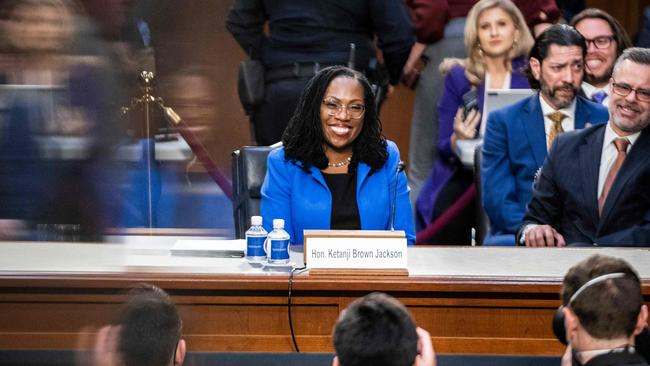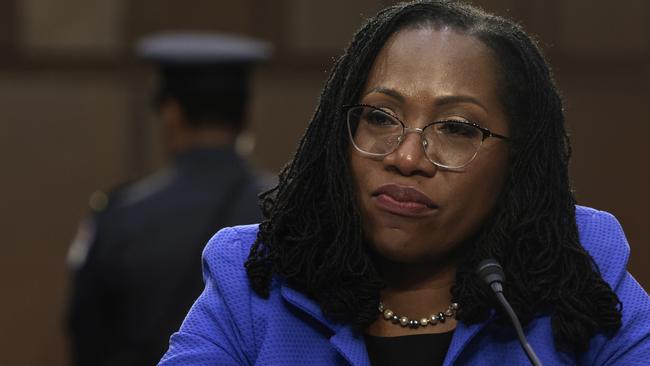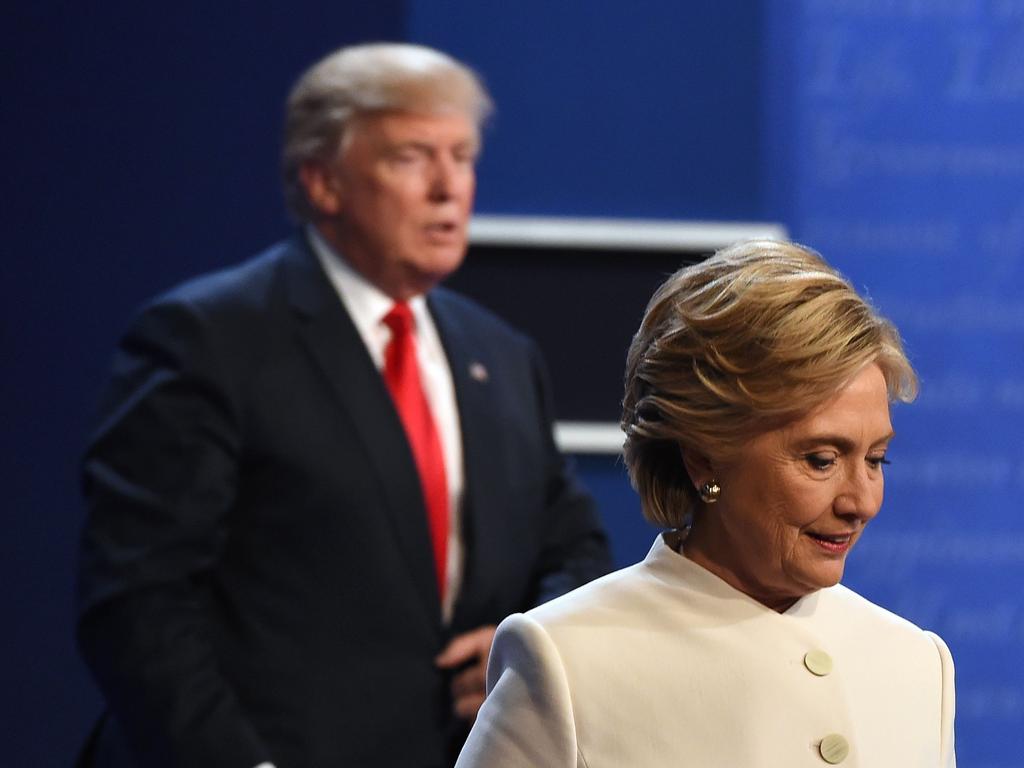Thank goodness our legal system is not like America’s
The blurring of judges’ and politicians’ roles in the US must never be allowed to happen here.

This week, hearings to confirm Ketanji Brown Jackson as the newest US Supreme Court judge have been a genteel affair compared to the crudity of past political spats over who will sit on America’s highest court.
Jackson is a clever appointee by Democrat President Joe Biden. Sure, she will be known as a quota appointment for being the first black woman to be considered for the Supreme Court. Biden said he would not look beyond that pool for a new judge. That is the way of the woke world.
Nonetheless, Jackson was astute enough to step beyond that milieu when she concluded her first day of Senate confirmation hearings this week by saying: “I know that my role as a judge is a limited one, that the constitution empowers me only to decide cases and controversies that are properly presented. And I know my judicial role is further constrained by careful adherence to precedent.”
Jackson’s comments will be more palatable to Republicans than a speech by the court’s first Latina judge, Sonia Sotomayor, that was dredged up at her confirmation hearing in 2009: “I would hope that a wise Latina woman with the richness of her experience would more often than not reach a better conclusion than a white male who hasn’t lived that life.”
Jackson appeared to step back into woke world of gender when she was asked, during her confirmation hearings this week, whether she could define a woman.
“Can I provide a definition? No,” she told Republican senator Marsha Blackburn.
“You can’t?” responded Blackburn.
“Not in this context. I’m not a biologist,” said Jackson.
A duck-for-cover answer? Or, perhaps Jackson is suggesting that biology defines a woman. That would be a fine outcome. And maybe her “I’m not a biologist” answer means that Jackson will stay within the lines as a judge because she is not a policymaker.
Years ago, I interviewed Supreme Court justice Antonin Scalia in his judicial digs in the grand SCOTUS building on One First Street in Washington DC.

The conservative Scalia, who became the bete noir of the liberal left elites in America, pointed to his vote – 98-0 in 1986 – as a sign that things have become far more polarised compared to when he was confirmed.
He was right. The confirmation of conservative judge Brett Kavanagh was an especially wild ride, a televised and social media spectacle with unproven accusations flying around and female protesters dressed to mimic Margaret Atwood’s red handmaids.
Even without rowdy media platforms, judicial confirmation processes in the US have long been viciously political. The reason is, in large part, explained by these three words – Bill of Rights. American judges can, if they chose, assume the role of social engineer, because a Bill of Rights can be easily moulded, interpreted and imposed to suit the political leanings of a judge.
Hence, in the US, judges can, and routinely do, make policy. And the results make for a long-term mess. Take abortion. You can agree with a policy that provides ready and affordable access to abortion for women, and also agree that, in a democracy, a court is not the right body to make that policy.
Test it this way. If SCOTUS, as the US Supreme Court is known, had not meddled here, abortion would no longer be a red-hot political issue in the US. In fact, it is likely that well-funded, well organised and very noisy conservative groups that were galvanised after the Roe v Wade decision by the Supreme Court in 1973 would have lost their battleground mojo if SCOTUS had stuck to its knitting. With less conservative fire and brimstone caused by a meddling SCOTUS, state legislatures in the US might have been able to enact abortion laws without the weird hype that this issue still attracts today.
Meddling judges might mean well, but their arrogance has been rotten for the health of America’s democracy. You know where this is going. We should be thankful that in Australia we don’t endure these scrappy political spectacles over judicial appointments, nor do we suffer from the same level of arrogance from judges who presume to act as philosopher kings. But we mustn’t be complacent either. This past fortnight is a reminder of how some judges in this country are champing at the bit to settle policy that should be left to our elected representatives.
The full Federal Court of Australia stuck to that basic democratic compact took when they overturned a trial ruling by Victorian Justice Mordy Bromberg.
To the delight of climate change activists, Bromberg created a novel duty of care on the Environment Minister towards young people when determining projects, in this case an extension of a coalmine. Chief Justice Allsop recognised the dangers of Bromberg’s judicial creativity, holding that: “A duty that calls up such questions should not be imposed: it is one of core, indeed high, policymaking for the executive and parliament involving questions of policy (scientific, economic, social, industrial and political), which are unsuitable for the judicial branch to resolve in private litigation by reference to the law of torts and potential personal responsibility for indeterminate damages, if harm eventuates in decades to come.”
Bromberg has form as a judicial policy maker. He was instrumental in trying to redefine, after the event, a casual employment contract as a permanent employment contract. The High Court, unanimously, was not impressed, overturning that result and saying “(t)hat it is no part of the judicial function to reshape or recast a contractual relationship in order to reflect a quasi-legislative judgment as to the just settlement of an industrial dispute”.
A true democrat will be overcome with relief that good sense, once again, prevailed. But only time will tell whether Bromberg will take note of the latest direction from a higher court about the proper, and limited, role of judges.
That climate change activists were shattered by their failed attempt to bypass parliament is a sure sign of why it is inappropriate for a judge to make policy that the country has not endorsed.
Perhaps there is something in the water cooler in the Victorian Federal Court chambers. Last week, another Victorian Federal Court judge, Bernard Murphy, expressed his interest in setting policy in the area of class actions. In a speech to a class actions seminar, Murphy condemned the Morrison government’s class action reforms which aim to deliver more funds to plaintiffs in class actions, and less money to litigation funders and lawyers. Murphy has good reasons to defend the current common fund orders. He has a strong interest in wanting the status quo maintained because he’s defending his own role in establishing the current system.
It would be naive to deny that politics and law are kept separate in Australia. You need only read the endless political musings in various legal publications to realise that lawyers love getting involved in politics. Law, for them, is boring. Politics, on the other hand, gives them a chance to fly, to socially engineer the sort of world they want, usually one that delivers them riches too. And the best part is they don’t have to take a pay cut or head to Canberra to be a politician.
It’s the same with judges who hanker to set policy that parliament has not. Though it helps to have one, they don’t need a Bill of Rights to pander to that desire. All they need is the right case, a creative bent, and scant regard for their accepted role as judges.
As Justice Jonathan Beach said when overturning Bromberg’s novel duty of care frolic: “This was a bold step to take, given trial judges normally only assess, admire or indeed chop down completed forms … it is for the High Court, not us, to engineer new seed varieties for sustainable duties of care.”
Shining a light on the activist tendencies of judges might help to curtail more policy making by the courts. That will be a good outcome for the health of our democracy.







With judicial confirmation hearings under way in the US, it’s time to once again thank our lucky stars that we don’t endure the same spectacle in Australia.